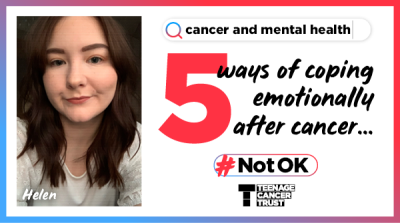5 ways of coping emotionally after cancer
Helen was diagnosed with non-Hodgkin lymphoma in 2016, aged 20, and was helped by Teenage Cancer Trust at University College London Hospital. Here, Helen shares some top tips on how to cope emotionally after cancer.
Because my cancer diagnosis was a surprise and the treatment was finished within eight months, I didn’t have time to get my head around it. What I’d been through didn’t hit me until way afterwards.
Life after cancer was and is something I have struggled with, but I have started to overcome some of those emotions by looking after myself emotionally. Here are some of my top tips on how to cope emotionally after cancer.
Recognise your emotions
This is something I really struggled with after cancer treatment.
There are so many emotions that can be stirred up after cancer such as anxiety, fear, anger, guilt, and loneliness.
The first thing I would say is all of these emotions are valid and you are right to feel them. Chances are, there is another young person feeling the same way.
I dealt with quite a lot of guilt that I wasn’t jumping for joy after being told I was in remission. I was supposed to be happy and I was. I just struggled to recognise what I was feeling, and the best thing I did was tell myself that my feelings and emotions are valid.
Talk to someone
It’s easier said than done, right? But it really is one of the best ways to cope emotionally after cancer.
When going through treatment, sometimes you don’t have time to take everything in. I know I didn’t. It was all about treatment and getting better.
After my cancer treatment is when I felt I needed more emotional support and talking really did help me.
Talking to family or friends can help you get so much off your chest.
Also talking to other young people who have been through the same thing can really help you recognise that what you are feeling isn’t weird.
However, there are professionals you can talk to as well. This might be your Teenage Cancer Trust Nurse or Youth Support Coordinator. And through my nurse, I was able to be referred to a psychologist for some in depth help, too.
Rediscover an old hobby or pick up a new one
As soon as I heard the word ‘cancer’ everything became a blur.
I fell out of love with a lot of things I used to love doing, as that reminded me of life pre-cancer.
A hobby of mine was cooking. I absolutely loved it. But chemotherapy treatment meant that my energy levels were low, so I didn’t have the oomph like I used to.
Fast forward to now and I’m back in the kitchen whenever I can be.
Within the last year I have also gained a new love for walking. It is great for fitness but does wonders for your mental health. There is nothing I love doing more than putting my earphones in, walking, and losing myself in a podcast.
Taking time for yourself and reflecting
There is nothing wrong with making time for yourself and reflecting on what has just happened. Cancer is a big deal and can take some time to fully sink in.
After treatment, there can be pressure to go back into work and education and pick up where you left off, but that can be really difficult.
I decided that I needed a year to process everything and try to come to terms with what had just happened. So, I took that time to figure out where I wanted to go in life.
It was at this point I decided that I wanted to become a social worker or youth support coordinator. Taking that year out before going back into employment and education was the best decision I made.
Take each day as it comes
There is no pressure to jump straight back into things.
Writing daily goals really helped me. Even if they were small goals like ‘I will go for a 20-minute walk today’. That is something that makes me feel good in myself.
But, if I didn’t reach those goals, I didn’t stress about it. Life after cancer can be tough and we need to be kind to ourselves.
So, try setting small but attainable goals everyday to help you build your confidence back up.
If you’re a young person going through cancer and you feel you’re struggling with your mental health, please do speak to your clinical team, Teenage Cancer Trust Nurse or Youth Support Coordinator. They’ll do whatever they can to help you, which may include referring you to specialist support.
